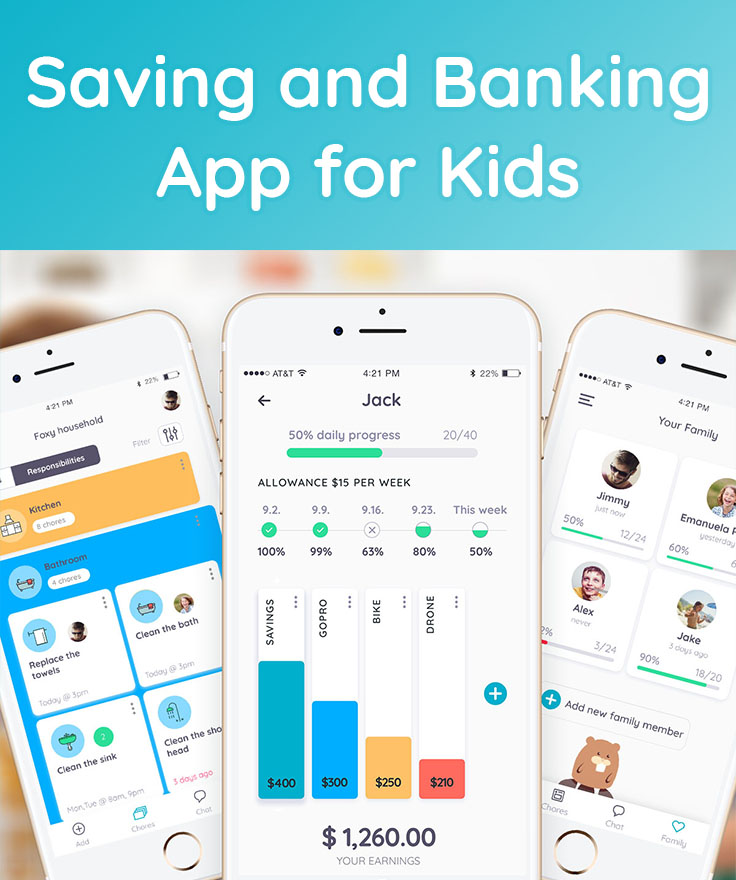finance Archives - Page 3 of 5 - Homey App for Families
Tips to Teach Kids the Importance of Credit Score

The role of a parent is to teach their kids valuable skills such as manners, social etiquette and smaller tasks like tying their shoelaces or brushing their teeth. A parent’s job is never ending but oh so rewarding. But, one of the areas that many parents neglect to focus on is teaching their kid the importance of a credit score. Your kid may think a credit score is just another number that doesn’t matter or they have no idea what a credit score is. This all depends upon how involved with the finances your kids have been. Today I want to give you some tips on how to teach kids the importance of a credit score.
How to Encourage your Teen to Save Money
 It may seem like a difficult challenge to teach your teen to save money. The teen years are certainly full of new challenges and most parents aren’t quite sure how they will survive. Reality is, every parent before you survived the teen years just fine, and I’m sure that you will too. One of the things that teens are starting to navigate on their own is money. With all the spending possibilities on offer right now, teens might not have much interest in saving for the future.
It may seem like a difficult challenge to teach your teen to save money. The teen years are certainly full of new challenges and most parents aren’t quite sure how they will survive. Reality is, every parent before you survived the teen years just fine, and I’m sure that you will too. One of the things that teens are starting to navigate on their own is money. With all the spending possibilities on offer right now, teens might not have much interest in saving for the future.
Today I want to showcase a few simple ways you can encourage your teen to save money so that they learn to be financially savvy adults.
How to Make Your Next Family Vacation a Breeze
There’s nothing like taking time for a relaxing vacation with your family. When it’s done right, you all create memories that last a lifetime. But vacations often become far more stressful than they should be, and much of that is because of poor planning. Here are a few of the top tips to help you plan a fantastic family vacation.
Big Spending: How to Begin Your Family’s Budgeting Journey
As daunting as the task may seem, building a family budget is important. Don’t complicate the task by trying to build a complicated spreadsheet, unless of course, you are an expert at this. Instead, old-fashioned paper and pencil can easily map the layout for your family budget. Below are five useful tips to help begin your family’s budgeting journey.
How to Explain Money to Kids in a Digital Age
 Our previous advice of using see through jars to explain saving money to kids, and showing differences between each coin and bill is still valid. But the truth is, that the physical object of money has started to disappear. Digital age brings us even more use of credit cards. And it also adds to the mix smartphone apps and other methods to pay for items without handing over actual cash (or anything – not even a card). This can make teaching kids managing money a lot more difficult. You can’t only teach them about the physical paper and coin money. Kids will need to learn more about money in the digital age. Today I’m sharing a guide to help you explain digital money to kids in a digital age.
Our previous advice of using see through jars to explain saving money to kids, and showing differences between each coin and bill is still valid. But the truth is, that the physical object of money has started to disappear. Digital age brings us even more use of credit cards. And it also adds to the mix smartphone apps and other methods to pay for items without handing over actual cash (or anything – not even a card). This can make teaching kids managing money a lot more difficult. You can’t only teach them about the physical paper and coin money. Kids will need to learn more about money in the digital age. Today I’m sharing a guide to help you explain digital money to kids in a digital age.
Why is it Sometimes Good to Pay Kids for Chores?

The discussion of whether or not to pay kids for chores is an important topic to address. While the opinion on this subject varies from home to home, there is a benefit to paying kids for chores. Those households who pay for chores use the logical reasoning thought process that adults get paid to do their job, so why not pay kids to do their job as well. The other side of the picture thinks that kids shouldn’t be paid to do chores as they should be a part of life skills they simply need to learn to survive as adults. While both sides of the discussion have valid points, today I wanted to share a few reasons why paying kids for chores is beneficial for certain things.
What Kids Learn from an Allowance
 Many parents struggle with teaching their kids about money because they don’t feel confident about the financial side of life as it is. There are some households who immediately feel an allowance is the right answer. They want to ensure their kids get a weekly allowance based on a list of chores that have to be completed. Then there are other households who feel chores should be a part of the kids’ day to day life because they need to be taught responsibilities. There is no correct answer when it comes to providing your own kid an allowance or not, it’s all about what works best in your household to go along with your views on this subject.
Many parents struggle with teaching their kids about money because they don’t feel confident about the financial side of life as it is. There are some households who immediately feel an allowance is the right answer. They want to ensure their kids get a weekly allowance based on a list of chores that have to be completed. Then there are other households who feel chores should be a part of the kids’ day to day life because they need to be taught responsibilities. There is no correct answer when it comes to providing your own kid an allowance or not, it’s all about what works best in your household to go along with your views on this subject.
Help Your Kids Avoid Hasty Money Decisions
 You have it all figured out, the kids are earning their own money and saving it. You seem to have figured out how to guide your children towards determining what a need and a want is. The kids seem to comprehend basic financial tips, they have a bank account and are earning money on a regular basis. Then it happens, something arrives on the market and your kid is ready to spend all of that hard earned cash on something without thinking it through. There are ways you can help kids avoid hasty money decisions, but you may need to read these tips to assist in guiding you so that you and your kids survive this scenario.
You have it all figured out, the kids are earning their own money and saving it. You seem to have figured out how to guide your children towards determining what a need and a want is. The kids seem to comprehend basic financial tips, they have a bank account and are earning money on a regular basis. Then it happens, something arrives on the market and your kid is ready to spend all of that hard earned cash on something without thinking it through. There are ways you can help kids avoid hasty money decisions, but you may need to read these tips to assist in guiding you so that you and your kids survive this scenario.
Why It’s Important for Kids to Learn about Banking Early
 It’s important that you think about your kid’s financial future as well as their health. It seems a parent often focuses on one area of growth throughout their days of raising children. It’s easy to get consumed with the basic life skills that you must teach a kid, but we often neglect to think about the bigger picture. Kids need to learn basic money management skills from a young age and having a bank account will help them learn this skill.
It’s important that you think about your kid’s financial future as well as their health. It seems a parent often focuses on one area of growth throughout their days of raising children. It’s easy to get consumed with the basic life skills that you must teach a kid, but we often neglect to think about the bigger picture. Kids need to learn basic money management skills from a young age and having a bank account will help them learn this skill.
Saving and Banking App for Kids
 Teaching kids how to manage money is a vital part of parenthood but most often overlooked. As a means to help inspire kids to learn how to complete chores for money, Homey now released new financial literacy features. It allows parents to transfer kids’ chore earnings to an actual bank account to promote long term saving, enables kids to learn to manage their funds with the help of virtual saving jars, and offers families an adjustable system to track their chores and responsibilities.
Teaching kids how to manage money is a vital part of parenthood but most often overlooked. As a means to help inspire kids to learn how to complete chores for money, Homey now released new financial literacy features. It allows parents to transfer kids’ chore earnings to an actual bank account to promote long term saving, enables kids to learn to manage their funds with the help of virtual saving jars, and offers families an adjustable system to track their chores and responsibilities.
